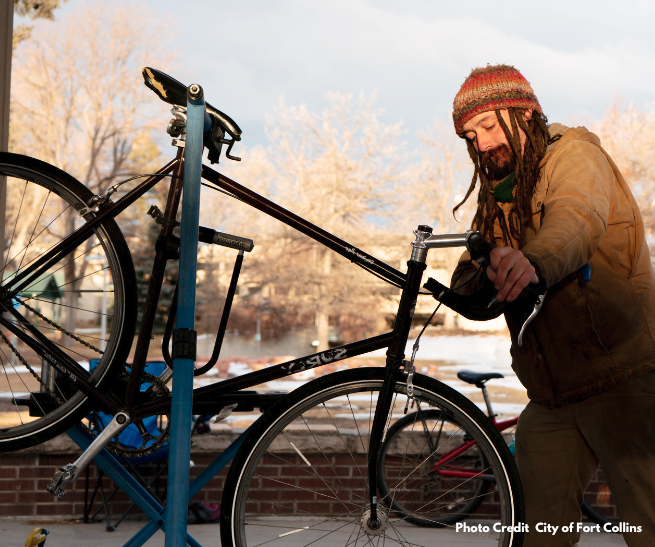 It started innocently enough for Bike Fort Collins’ resident bike mechanic Alex Hovorka.
It started innocently enough for Bike Fort Collins’ resident bike mechanic Alex Hovorka.
“My dad never bought me new tubes; he made me patch them,” Hovorka says.
Years later, he earnestly patches flats on bikes of all kinds, many of which go to undocumented immigrants and low-income community members who don’t have access to their own bikes.
While Alex has been riding and repairing since he was a kid growing up in Fort Collins, he started working as a professional bike mechanic 10 years ago. Today, he holds multiple Shimano certifications, worked at Recycled Cycles, and is now a paid member of BFC’s staff.
“Is my BFC work a side hustle? No,” he says. “It’s now a large portion of the work I do, and since 2020 it’s a lot more.”
In late 2019, BFC reached out to him about a paid role as mechanic coordinator. He accepted and got settled into the role, collaborating with the organization’s Safe Routes to School (SRTS) Instructors and FC Moves staff (witin the City), BFC’s primary partner in the program. He became very involved in the SRTS program, but when the world entered the Covid-19 pandemic, schools shut down, making delivery of the program impossible.
With time and talent on his hands, it wasn’t long before BFC found another way to deploy Alex.
Having just concluded a grant-funded Active Living Program focused on a local mobile home park community, BFC had aligned with the Larimer County Department of Health and the Built Environment (LCDHBE) to continue doing similar work. With a storage room full of bikes BFC inherited from a a network of bike-lovers who passed on the lesser used bikes from their quivers, he began readying those bikes for second go-arounds. As BFC and he began to find new homes for them, they discovered a cohort of women who wanted to ride but lacked bikes. The riders, almost exclusively Spanish-speaking, were fitted with bikes and helmets and given some tips for safe riding. In a way it was like an evolution of SRTS.
Cyclists of every kind know that self-sufficiency is an important element. Soon, the women wanted to learn some bike repair skills. “The basic stuff, like fixing a flat, brake adjustment, and chain maintenance,” Alex says.
“It’s incredible,” he adds, “to get people on bikes who might not ever ride if not for this (program). It turns out, if you get a group of 10 ladies who never would ride, they will ride every Thursday if they have bikes.”
With his BFC hat on and under the same alignement with the LCDHBE, the bike mechanic also takes his show on the road to a variety of income-qualifying housing complexes in Fort Collins, providing on-site repairs. Posters go up and the word is spread with help from a resident Community Champion at each complex, telling residents to bring their bike to a specific location on the property on a particular day. Alex loads up his truck, and starts tuning them up, one by one. Then he reunites the bikes with their riders, again with help from the community champions.
A bike in disrepair is at least less safe and at most, downright unsafe, and eventually unrideable, afterall.
Gathering donated bikes to the rented warehouse/storage, logging them into inventory while assessing their repair needs, and then making them work again, is another element of Alex’s work.
You could call it a cycle of donation and repair and cycling.
